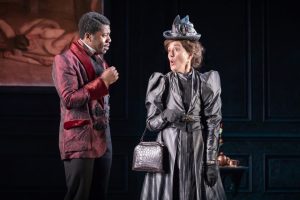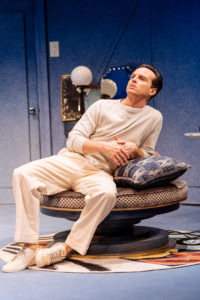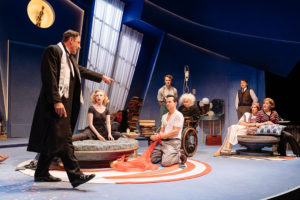★★★

I don’t want to look a gift horse in the mouth because it is great to have the opportunity to see all four of Oscar Wilde’s classic comedies in stage productions. Unfortunately, good as they are, these Classic Spring Theatre Company versions really don’t work that well on film, hence my three star rating.
I think it’s a lot to do with the difference between theatre and film. For a start, in a large auditorium like London’s Vaudeville Theatre, stage actors need to speak slowly and loudly to be understood at the back of the upper circle. To be fair, when we watch a large scale play on film, our brains usually allow for the slightly melodramatic way actors deliver speeches on stage. However, Oscar Wilde’s fast-moving, sharp-witted dialogue is really sabotaged by this approach. The strong element of melodrama in these plays becomes very obvious.
You also realise just how much of the content of most stage plays is verbal. When we’re watching a drama made for the cinema or TV, we’re used to lots of changes of scene, fast editing, and action. On stage, let’s be honest, in most plays most of the time, they stand around and talk. In the first halves of all of the first three plays, partly because of the pace, I was thinking ‘My goodness, they talk a lot’. This wouldn’t even occur to you if you were there in the theatre, hanging on every word. At least at home, you can press pause and make a cup of tea. Whatever you do, don’t pour a glass of alcohol!
Thank goodness they pick up the pace after the interval. By the way, each interval is spoiled by a silly music hall song, inappropriate to mood of high society that’s being portrayed.
The third acts follow the interval, and in the first three they are invariably the best, as all the plot setups of the first half come to an explosive fruition, the fourth act being how it all works out. These third acts are full of surprises and Wilde’s trademark epigrammatic wit.
Just to remind you, if you want to watch them in chronological order, the plays start with Lady Windermere’s Fan in which a woman thinks her husband is having a secret affair whereas, in fact, he’s hiding a very different secret. In A Woman Of No Importance, a single mother battles with the secret father to prevent her son falling under his influence. Then comes An Ideal Husband in which a secret mistake made early on his career threatens to derail a successful politician but more importantly ruin his marriage to his holier-than-thou wife. Finally, there’s Wilde’s masterpiece The Importance of Being Earnest in which the two main male characters maintain secret lives causing much confusion, as well as upsetting a certain Lady Bracknell.
So they all concern secrets, which we now see as being very significant given what we know about Oscar Wilde’s own secret life. It’s hard not see some personal feeling in epigrams like ‘scandal is gossip made tedious by morality’ or ‘Sooner or later we have all to pay for what we do’.
The first three play owe a debt to Ibsen even as Wilde blends in his legendary wit. So there’s quite a bit of serious talk about love and real goodness in a hypocritical society. ‘All lives, save loveless lives, true Love should pardon,’ says one character.
The exception is The Importance of Being Earnest in which Wilde goes all out for comedy from the first line and never stops, even if there is an underlying satire of society’s hypocrisy.
The productions are well acted and the naturalistic, late Victorian settings are spot on. I particularly liked the lightness of Paul Wills’ designs for Lady Windermere’s Fan.

In the first three plays, women play major parts and the actors in these productions make the most of their meaty roles. Eve Best is particularly impressive in A Woman of No Importance. Her breathless shock as she reacts to a momentous decision that she makes at the end of the play is heart-grabbing.
You probably want to know about Lady Bracknell. Well, Sophie Thompson plays the part well, enunciating every vowel and consonant as if she wants to control each word she speaks, as well as controlling everything else. There are prototype Lady Bracknells in the earlier plays- typically snobbish matriarchs. Jennifer Saunders is excellent in Lady Windermere’s Fan, Susan Hampshire great in An Ideal Husband but the best is Anne Reid’s employment of a tiger smile as Lady Hunstanton in A Woman Of No Importance.
It’s difficult to make a proper judgement on the quality of the stage productions but the best is An Ideal Husband but then the material is very good. The director Jonathan Church (each production has a different director) has a lightness of touch. And there’s a stellar cast which includes Nathaniel Parker, Frances Barber, Edward Fox and the excellent Freddie Fox, all languid limbs and ironic smiles, as the louche Lord Goring who is, to quote a different Wilde play, ‘pretending to be wicked and being really good all the time’.
Marquee.tv is a subscription channel offering a range of recordings of live performances including many Royal Shakespeare Company productions.


